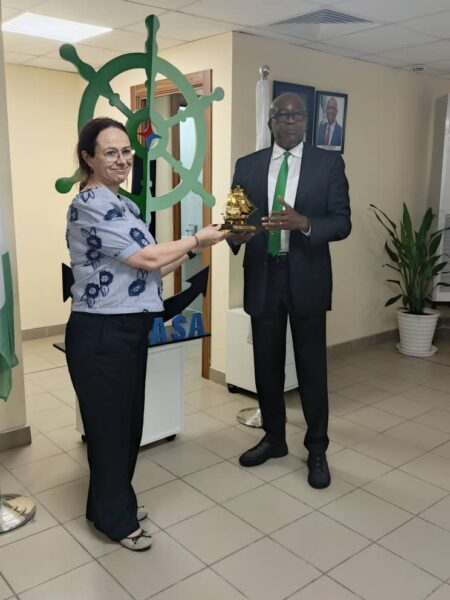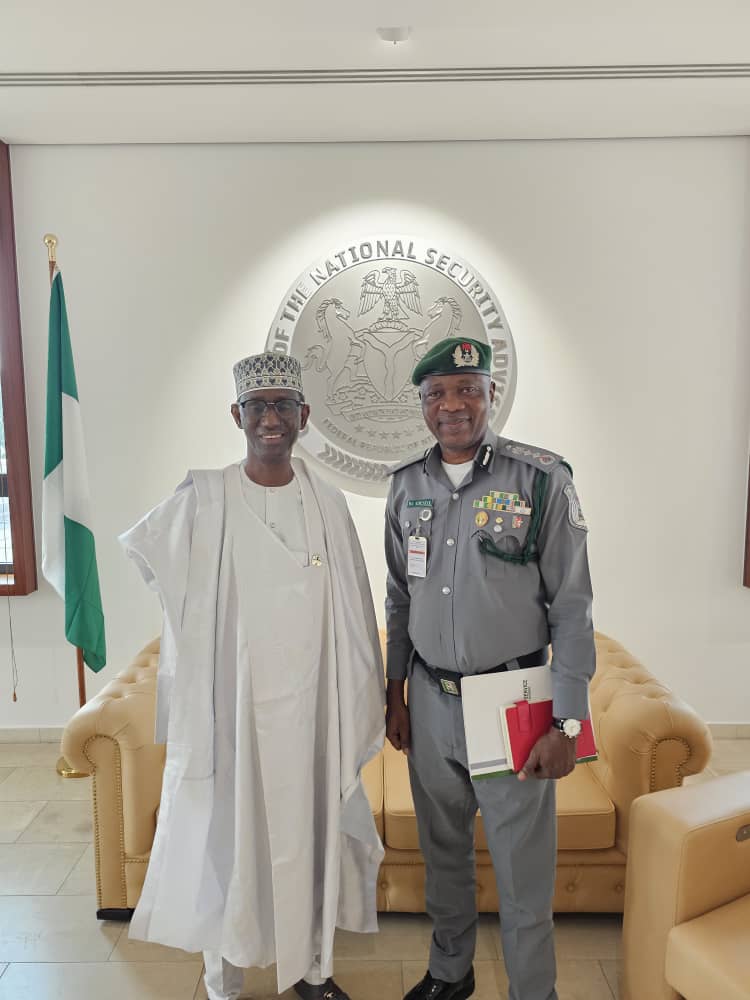Nigeria has invested heavily in resources to address incidences of piracy and kidnapping in the Gulf of Guinea, and there had been significant reduction in those cases since the Deep Blue Project was created in 2021 by the Nigerian Maritime Administration and Safety Agency (NIMASA).
The information above formed the background for which NIMASA sought the need for global shipping companies to consider ending the burden of war risk premiums placed on Nigeria-bound ships.
The Director General of NIMASA, Dr. Dayo Mobereola, made the call on Thursday in Lagos, while meeting with a Danish Government delegation led by Kristin Skov-Spilling, who is the Chief Technical Advisor of the Danish Ministry of Foreign Affairs.
The NIMASA DG was represented by Mr. Chudi Ofodile, the Executive Director in charge of Finance and Administration.
Speaking about the concerns of Nigeria’s enormous investments to check maritime crimes in the region, yet without commensurate recognition, Ofodile said it was time the global maritime community got honest about the issues, based on the empirical evidences.
“Nigeria bears the bulk of the cost for resources to check piracy and other crimes in the Gulf of Guinea. We made the commitment with the hope that every other country would make a contribution.
“I remembered that in installing the first satellite system, we paid a couple of thousands of Pounds. Somewhere along the line after the first two years or so, we continue to make that commitment on behalf of the region. Yes, we are the biggest country in terms of size and economy, and so we should bear a higher proportion of the cost, but it shouldn’t be all of the cost and without a timeframe too.
“Then, it takes us back to the issue of war risk insurance premium. So what gains accrue to the country in the face of freight costs? You talked about insurance being the concerns of private companies, but when sanctions come, it is handled by the government of the country. So, we have to be honest about this,” Ofodile said.
He spoke about the need for Nigeria to use facts to push back misconceptions with regards to how much has been achieved with maritime domain security in the region, as he particularly made references to regional collaborations, and highlighting the gains of training partnerships with the Kofi Anan International Peacekeeping Training Centre, with support from the Danish Government.
Ofodile requested more collaboration, particularly in dealing with the persistent challenge of illegal, unreported, unregulated (IUU) fishing, an economic crime that has left the coastal populations impoverished and highly vulnerable to maritime crimes.
“The training should actually be more. We have challenges, especially with foreign vessels coming in to do IUU fishing. These are some of the areas we would need support, because we have done so much as a country,” he said.
For Mrs. Gladys Owolabi, Head of the Deep Blue project in NIMASA, opportunities for collaborations still abound in skill acquisition centres established by the Agency to train and economically empower people in the coastal communities with sources of livelihood. She also noted that there could be enhanced information sharing training for the populations within those areas, which would support the goal of checking pirates’ activities.
The Agency also wants Denmark’s collaboration extended to port security and ship interfacing, as requested by Mr. Isa Amodu, of the International Ship and Port Facility Security (ISPS) Code Implementation Unit of NIMASA.
On her part, and speaking on the purpose of the visit, Kristin Skov-Spilling disclosed that the visit, which covered Ghana, Nigeria, Togo, Benin, Ivory Coast, and others, was within the framework of an assessment of the partnership programmes dealing with maritime security.
She said that measuring the reach and impact of the programmes was an audit necessary for future planning, just as it would be needed for addressing whatever bottlenecks might have arisen.
“The meeting regularly is something that Denmark does on several programmes. The Auditor-General in Denmark demands that these programmes have to undergo quality checks. There is a need to assess if it is going as planned or if there are certain bottlenecks that need to be addressed. Since context changes, it is also needed to look at what areas are still relevant. So, we are at the point of this temperature taking to ascertain where the programme is,” she said.
She, however, appreciated the level of engagement during an interactive session with the journalists who participated in the training in Nigeria in 2023. “Your suggestions for further training programmes and your views around this programme indicate how well engaged you were with the training,” she said, as she highlighted the Danish government support through collaborations with the United Nations Office on Drugs and Crime, as well as the Interpol.
Skov-Spilling said that similar assessment would soon be done with the Maritime Code of Practice that the KAIPTC launched in 2024, in collaboration with Denmark, to protect women in maritime security.
On the delegation with Skov- Spilling were Viggo Aalback, Henrik Laugesen, Cecile Collin, Joel Johnson, Ida Dalgaard, Benjamin Serebour.


































































